Starting Over
Television and film get it partly right. Blue crackling energy does always form moments before the time machine arrives, but it doesn't gradually materialize. One moment nothing exists and the next the time machine is simply there. Normally, you use it such that no one sees you arrive, but in this case, it was important that I be seen arriving. I open the door and step out into Richard's apartment.
"Richard? I mean, Richard Garfield?"
"Yes. Is that a time machine?"
"It is. It's Time Travel Week on the website and it kind of inspired me to do something I've always wanted to do. I borrowed the R&D time machine so I could come back and talk to you, right now. I figured out the exact moment where you had completed the majority of the work on Magic's design but still had time to make changes."
"Website?"
"Future stuff. Don't worry about it."
"Do we know each other? I mean, will we?"
"Yes. When I come from, we're friends and have been for twenty years."
"So you're from over twenty years in the future?"
"2015. Yeah, kind of like Back to the Future 2, although I should warn you that film gets a few details wrong."
"So Magic is successful?"
"More so than you could possibly imagine. The game has millions and millions of players. It's printed in eleven languages. There's a Pro Tour circuit and hundreds of thousands of sanctioned tournaments every year."
"What are you doing here?"
"In the future, when I come from, I'm the head designer for the game. One of the questions I get all the time is what would I have changed if we were starting Magic all over."
"And so you came back to the exact time where you would still be able to make changes? Did it take a lot of research to figure this out?"
"No, I just asked you."
"So I'm still alive in 2015?"
"I'm breaking enough rules as it is. I should probably stop telling you about the future. Well, non-Magic future."
"Apparently there are some things you would change."
I pull out my iPhone and pull up my list. Richard starts staring intently at my phone.
"Okay, I'm doing a really bad job of hiding the future."
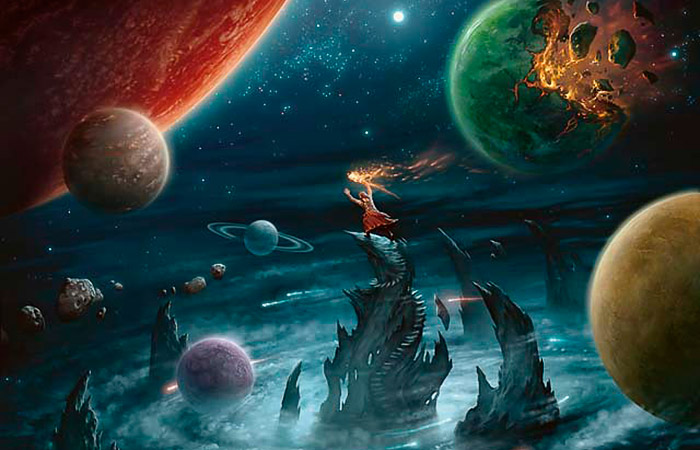
Time Reversal | Art by Howard Lyon
Richard keeps staring.
"It's a phone. Phones are going to get pretty cool."
"Sorry. So what did I get wrong?"
"Let me begin by saying that you got so many things right. Obviously, the game is a giant success and a lot of that is directly attributed to the core of the game design. That said, there were a few misses."
"Such as?"
"Ante was a huge flop."
"Really? It was one of the major forces making sure there was continual deck flow."
"Just curious. How much do you anticipate people are going to buy of Magic?"
"I assume people will begin with a starter deck and maybe buy four to six boosters over time."
"What if I told you people would buy boxes of boosters?"
"Oh. That means there are a whole bunch of overpowered cards. We were assuming that there would most likely be no more than one of any rare in a particular play group. We knew that we'd only get into trouble if the game was wildly successful, and then it was a good problem to have and we'd solve it when we got there."
"You did. We have something we call the banned and restricted lists."
"Lists? The game's big enough that you guys have created multiple formats?"
"You have no idea."
"What else didn't work out?"
"The forty-card deck restriction quickly got changed to sixty-card for any Constructed decks. As you hypothesized, Limited play where you open up booster packs and play has become very big. The other big areas that went through a lot of change were the rules and the color pie, I think what you originally called the color wheel."
"What changed?"
"The rules were, to be a bit blunt, a little hodge-podge in the beginning. There wasn't a consistent system for how everything worked. The biggest advancement there was the creation of a spell resolution system we call the stack. All spells now use a first-in, last-out system. This allows us to have damage resolve when it happens rather than stick around until the end of the batch."
"How do interrupts work in this system?"
"They don't. When we created it, we retired interrupts. Last-in, first-out allows us to do the counterspells and the kinds of things you made interrupts to do."
"And the color wheel?"

"The philosophies were very good. We basically haven't changed those—although we have refined them a bit. The biggest thing we did was get a little tighter on which colors can do what. We moved around a few things to help make the colors' shares of the pie a bit closer in size. To be fair, the refinement is an ongoing project. The color wheel existed in the first place to make sure that colors had weaknesses and decks would be forced to dip into other colors. You just need to tighten it up a little. Also, that thing where you allowed colors to use mechanics from their opponents' part of the color pie as weapons when fighting against them muddied things up a bit."
"What else?"
"Power-levelwise, you misjudged the power level for spells and creatures. You made the first much too high and the latter much too low. We spent over fifteen years just trying to get those two to the same level."
"This is fascinating. Keep going."
"There are other advancements, like collector numbers and rarity indicators."
"But that will make it much too easy for players to figure out what cards exist in the game. I mean we want to keep an air of mystery."
"Yeah, about that. The world's going to be changing pretty soon and information is just going to be a lot easier to share."
"Because of the phones?"
"Partly. I know you started the game wanting to keep a sense of mystery and have players discover cards as they played other people, but technology is just going to work against you there. Also, sharing deck technology is going to be a big part of community-building. One of the other big changes was the introduction of a parallel version of premium cards. Each card exists in a fancier version using foiling that shows up at a lower frequency. Also, by the way, we add a fourth rarity we call mythic rare that shows up in the rare slot in about one in eight boosters."
"I thought about that, but I was worried they'd just be too hard to get. Then again I was off by a magnitude about how many cards players were going to have."
"Another thing we introduced, which I assume you might have started with if you had thought about it—in creature types we use a race/class system."
"Like Dungeons & Dragons."
"Yes. That was one of our inspirations. Most humanoid creatures have a race they belong to—we added in Human—and a class representing the role they fill. So, Human Wizard or Goblin Warrior."
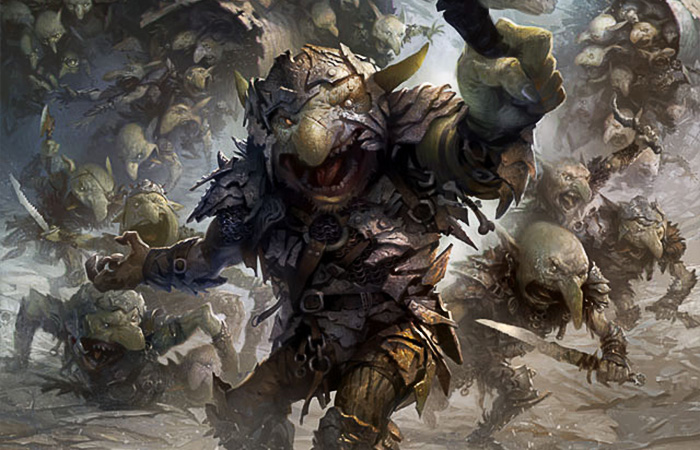
Goblin Rabblemaster | Art by Svetlin Velinov
"I like that."
"Another big change was we shifted away from Planeswalkers from having god-like powers. We massively lowered their power level to help us tell stories about them. They now basically just have the ability to walk between worlds."
"To visit all of Dominia?"
"Yeah, that name hasn't really stuck. We just call it the Multiverse now. We also made a new planeswalker card type. It's become very popular and has done a great job of getting our main characters both in the game and story."
"Wow, a lot of changes."
"Yeah. I'm not done yet. As you surmised above, Magic now has a whole bunch of different formats divided into two groups—Constructed and Limited. The biggest Constructed format is called Standard and it uses the current two years' worth of cards. In the near future, for me that is, it's going to be eighteen months."
"So that main format has constant flux and is not forever victim to power level mistakes?"
"Yes."
"That's ingenious."
"It's funny. It was horribly received at first but has gone on to be the defining format of the game. In Limited, the most popular format is called Booster Draft. You open up a booster pack, take a card and pass it to your neighbor."
"I'm so happy Limited has taken off. The playtesters enjoyed it but I wasn't sure if players would be willing to buy more product just to play it."
"There's also a whole bunch of casual formats that mostly were fan generated that have a significant following."
"That's exciting."
"I'm not done yet. It has been over twenty years. We also have keyworded a bunch of abilities. The Serra Angel ability is now called vigilance. Being able to attack the turn you play is called haste. The Thicket Basilisk ability is called deathtouch, although without the wall rider. The Giant Spider ability is called reach. Intimidate is kind of like fear except the color that can block it is whatever matches the color of the creature it's on. There's also a few abilities from cards you haven't made yet. Lifelink allows you to gain life for every damage you deal. Double strike allows you to have first strike damage and still have normal damage. Indestructible, well, can't be destroyed."
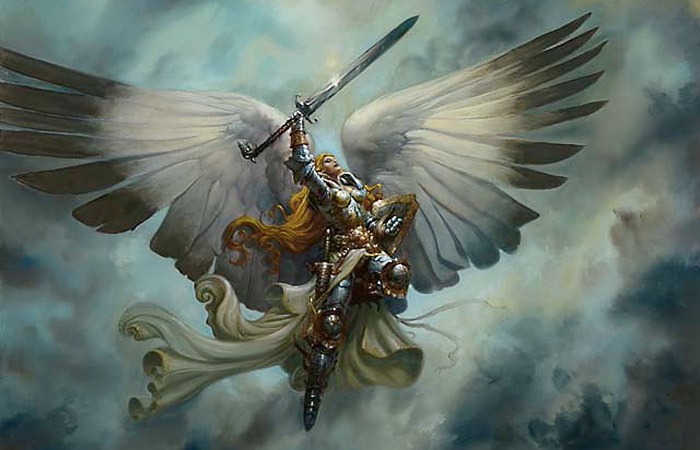
Serra Angel | Art by Greg Staples
"That's a lot of vocabulary."
"It is. We have pulled some of the vocabulary you use. Banding's gone and protection, landwalk, and regeneration are used sparingly. Speaking of vocabulary, we changed 'in play' to 'the battlefield,' 'remove from the game' to 'exile,' and enchantments that enchant things to 'Auras.' Also, we eventually shifted things around so that every card type is simply listed. Creatures say 'Creature' rather than 'Summon,' enchantments say 'Enchantment' rather than 'Enchant blank," and artifacts are all just 'Artifact' and are not divided into things like 'Mono Artifact' and 'Poly Artifact.' Oh, also, we created a tap symbol rather than saying that you tap things. And basic lands no longer have text in their text box but just have a giant mana symbol."
"You guys have been busy. I assume there's more."
"Magic has introduced a few things since the game began that have become evergreen. We have something called Equipment. It's an artifact subtype that functions like Auras but goes on the battlefield, in play, when cast or when they creature it equips dies. Oh, and we're back to using 'dies.' We stopped using it for a quite a while and then brought it back. Cantrips are cards that let you draw a card as an additional effect. It's allowed us to make cards with effects that normally cost less than one mana. The game now has multicolored cards that costs multiple colors of mana. I assume that is one you were aware of. We have hybrid mana, which is mana that can be paid by one of two colors. It's an OR to contrast to multicolor's AND. We have these things called split cards where we print two miniature cards on one card and you can choose which one to cast. Multicolor, hybrids, and split cards aren't used every set but are allowed by any set that needs them."
"Any other advice you can give me?
"Yes, be careful with your art. A lot of early Magic cards caused confusion because the picture didn't match what the card did. The biggest offender was flying. Either a card looked like it flew and didn't or didn't and looked like it did."
"Be careful with the art. Got it."
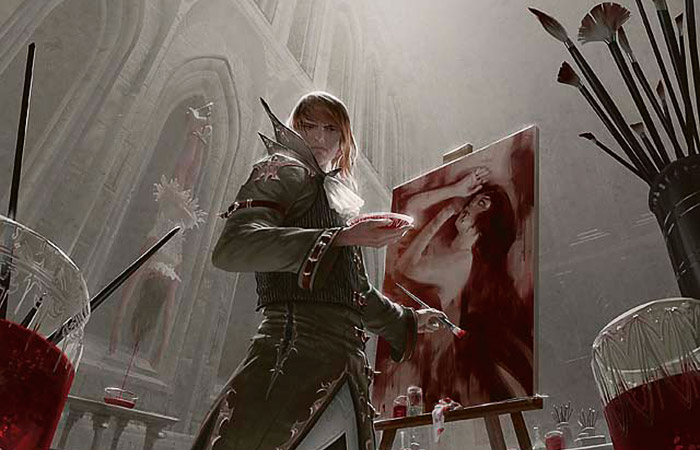
Blood Artist | Art by Johannes Voss
"We also changed the card frames to make the words easier to read. Especially in the name. The original font and layout made reading cards from far away very difficult."
"I didn't realize that."
"Oh, also, let me save you a little time. You're going to consider changing the card backs for each set. Horrible idea. Don't do it. Although, I do have a few small changes. Take off 'Deckmaster' from the back. It isn't going to work out. Change the font from blue to yellow. And there's a little accidental pen mark you might want to clean up."
"Okay, so that's it. That's all the changes?"
"Most of them. Man, I know I'm forgetting a whole bunch of stuff."
"Really?"
"But none of this was the major reason I'm here. What I'm most interested in is talking about stuff we never did and now can't because it's too late. There are a bunch of things I would love to do if we were starting from the beginning."
"I'm very interested to hear that, as we are at the beginning. What should Magic do that it didn't? It is very strange talking about Magic's future in its past tense."
"I'm glad you asked. First, I would make instant a supertype rather than a card type. There wouldn't be instants and sorceries. All nonpermanent spells would be sorceries. Then the subset that now are called instants would be instant sorceries. Permanents wouldn't have to have flash. Oh, that's another keyword I forgot to mention. It allows you to play permanents when you can play instants. They would just have an instant supertype. There would be instant creatures, instant artifacts, and instant enchantments. This would allow us to have one less keyword, make rules text less wordy and finally have a single word for nonpermanent spells."
"That would be very easy to do."
"Exactly. In the future, there are just too many cards referencing instants and sorceries that the change would be too confusing. But if the game just started that way…"
"How many cards are there where you come from? I mean when you come from?"
"Over 15,000."
"Okay, I'm starting to see why there've been so many changes."
"Next, I would change the card frames so that they all look a little different, especially between permanents and nonpermanents. Also, I'd make sure lands are very distinctive. And I'd make sure these changes could be observed when the cards are fanned in your hands. There was a set called Future Sight that had 'futuristic' frames that I'd be very tempted to borrow from. They had the mana cost running down the left side of the card so you could see it when you fan your hand. Also, by being on the left side, you could see the name and the mana cost when fanned. In the upper left hand corner was a symbol that represented the card type. I would keep that as well."
I showed Richard an example of the Future Sight card frame on my phone.
"I would change two things, though. One, I would have the mana symbol start with the colored mana. It's the most important info and it's how players just want to talk about the mana cost. It also would make the colored mana symbol be closer to the corner for easy reading while fanning. The second thing I'd do with the mana symbols is I'd change how we represented generic mana. I'd have a mana symbol that represents one generic mana, and if a card has more than one then the mana cost would list more than one. For example, a Hill Giant would have four mana symbols, first a red mana symbol and then three generic mana symbols. I'd probably have to have a larger generic symbol to represent five colorless mana to allow bigger colorless mana costs to be written. The reason for this change is I think it's just the way to write it that makes it the easiest for newer players to be able to read and understand. Each mana would be represented by one mana symbol."
"Interesting."
"I've just had to teach too many new players how to play and sit through too many focus groups to realize that the current system of writing mana costs is not the most optimal. The problem is aesthetically it would be too jarring to have one large chunk of Magic cards look one way and the rest look differently. We learned that from doing the handful of futureshifted cards in Future Sight."
"Anything else?"
"Yes, if I was starting all over, I would make more of a mechanical break between artifacts and enchantments. I would make all global effects the domain of enchantments. Artifacts just wouldn't do it. In exchange, I would make one use per turn the domain of artifacts. It already has the tap symbol—well, it eventually does—and I wouldn't make any enchantments that are effectively items with effects that you use once per turn, although once-per-turned triggered effects would be fine. I tried to make this change during Mirrodin block but the problem was there were too many famous and beloved cards that could never be brought back. It was decided to be too big of a cost, but if we just started from the beginning players would know those cards through this lens. Howling Mine would just be a blue enchantment, flavored correctly, and the public wouldn't know a world with anything different."
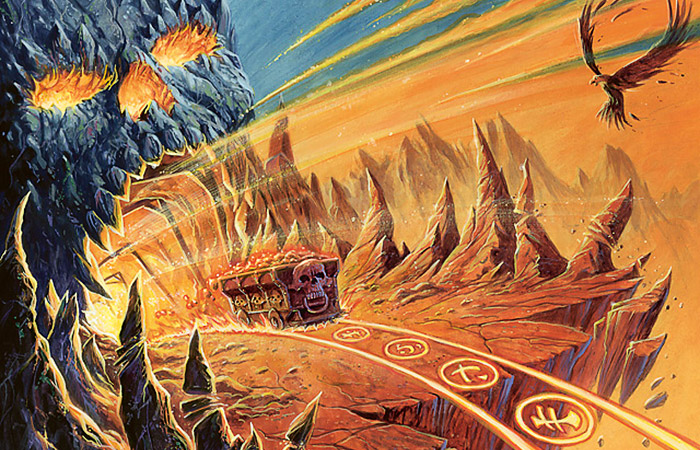
Howling Mine | Art by Ralph Horsley
"Mirrodin is an expansion?"
"And a plane. It was an artificially created mechanical plane. By the way, Magic's going to stick around on Dominaria a little too long. Something else you could fix. Also, if we were starting over, I would spend a little more time thinking through the creature types. It kind of evolved along the way and it's very inconsistent. I would start with race/class and spend some time thinking through how best to logically divide things up. Animals, in particular, need some attention. Oh, and the creature type should be Dog."
"Rather than what?"
"Um, nothing. It's just Dog. That one's important. Also, while we're talking creature types, I'd make Phyrexians into a creature type. We kind of missed the ball on that one."
"What are the Phyrexians?"
"They're going to be a major bad guy race. You'll meet them soon enough."
"Okay."
"While we're on the card type line, I'd also like to explore having some flavorful supertypes like Fire and Water. It would allow us to create some decks that are thematic but cross card types."
"Why don't you do that in your time?"
"We spent too long not doing it that it would feel very inconsistent and make it hard to reprint a lot of famous cards from the past—your future. And while we're talking supertypes, here's a big one for me. I would have the legendary supertype carry no mechanical baggage."
"Legendary?"
"It a signifier of a unique character or object or place. They get a lot of attention because they're very flavorful. There's even a big casual format built around legendary creatures. The problem with our current rules is it's mostly a drawback and I think having the subset of cards you want your audience to love shouldn't have to come with a built-in drawback. The problem is we've developed for years around the drawback, and having the rule in place for so long makes it very hard to take away. But if it was never there in the first place, the game would have formed around it and I believe we'd be in a better place. Note that it would be a tag that we'd make matter with other cards but I believe we would make being legendary mostly a positive thing rather than negative."
"You've obviously thought a lot about this."
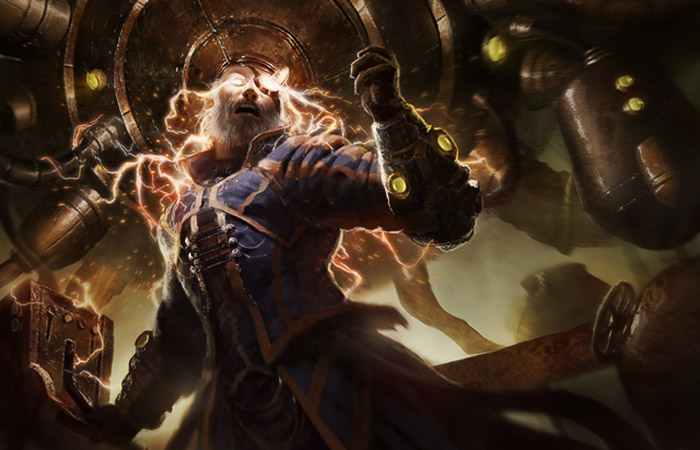
Thoughtflare | Art by David Rapoza
"You have no idea. I kept thinking about doing a podcast on the subject."
"A podcast?"
"An audio recording."
"Is that big in the future?"
"It surprisingly is. Here's another thing I'd do. You know how you have artifact creatures in Alpha—that's what we call the first printing of the first set? I would have enchantment creatures as well. I would just take things that seem to be made out of magic, you know like illusions, and just make them enchantment creatures. Use flavor to carry the designation instead of mechanics, which would let us have vanilla enchantment creatures. I believe if we had just started Magic thinking this way, it would be a normal part of the game."
"Isn't that something you could change in the future?"
"Maybe we could introduce a brand-new race of enchantment creatures, but it's hard to reclaim old concepts that have existed for years not as enchantment creatures. Once again, it also makes it hard to reprint old favorites if we change up how certain things are represented. If things had always been that way, players wouldn't think twice."
"Is that all?"
"That's most of it. A few other things. I'd look into a way to get the beginning phase down to two steps rather than three. I wouldn't have the rule that spells fizzle if the target is removed. I would say 'discard from the hand' and 'discard from the library' to have a way to mill cards that players would get."
"Mill?"
"Slang for putting cards from the top of the library into the graveyard. I think that's it. I think that's everything I would do."
"Well, you've given me quite the list. You timed this correctly, too. I'm pretty sure I have the ability to make most of these changes. And I trust you that these would improve the game."
"One second."
I pull out the memory-wipe stick.
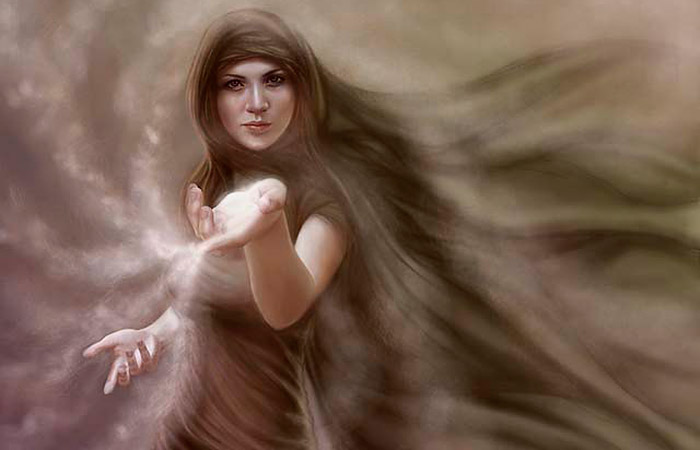
Vanish into Memory | Art by Rebekah Lynn
"I can't let you do that."
"What?"
"I just needed to get this off my chest, but I've seen far too many time travel movies to actually mess with the past. Magic is the game it is today because of everything you did, and even one small change could alter the timeline where Magic becomes the game it is. I have no guarantee that the things I would change would be the right call, so I'm going to have to erase your memory to ensure that today's conversation never happened for you. It was great getting a chance to meet you—I mean this version of you. It's a memory that I at least will cherish. Thanks for the talk. I have to get back to the future to make sure I get my article done for the upcoming Sultai Week."
"I have no idea what that is, but before you wipe my memory, I just want to say thank you for showing me a glimpse of what Magic is to become. It's quite exciting. I can't wait to see it all happen."
"The game has had a profound impact on my future as well, so thank you for making it."
I flash Richard, and by the time he comes out of it I am long gone.
"Drive to Work #194 – Scourge, Part 3”
“Drive to Work #195 – Scourge, Part 4”
This week have the the last two parts (of a four-part series) on the design of Scourge. Dragon-themed sets have come a long way.
- Episode 195 Scourge, Pt. 4 (15.2 MB)
- Episode 194 Scourge, Pt. 3 (15.2 MB)
- Episode 193 Scourge, Pt. 2 (14.8 MB)
- Episode 192 Scourge, Pt. 1 (14.4 MB)
- Episode 191 : World Building (13.4 MB)
- Complete Drive To Work Podcast Archive

